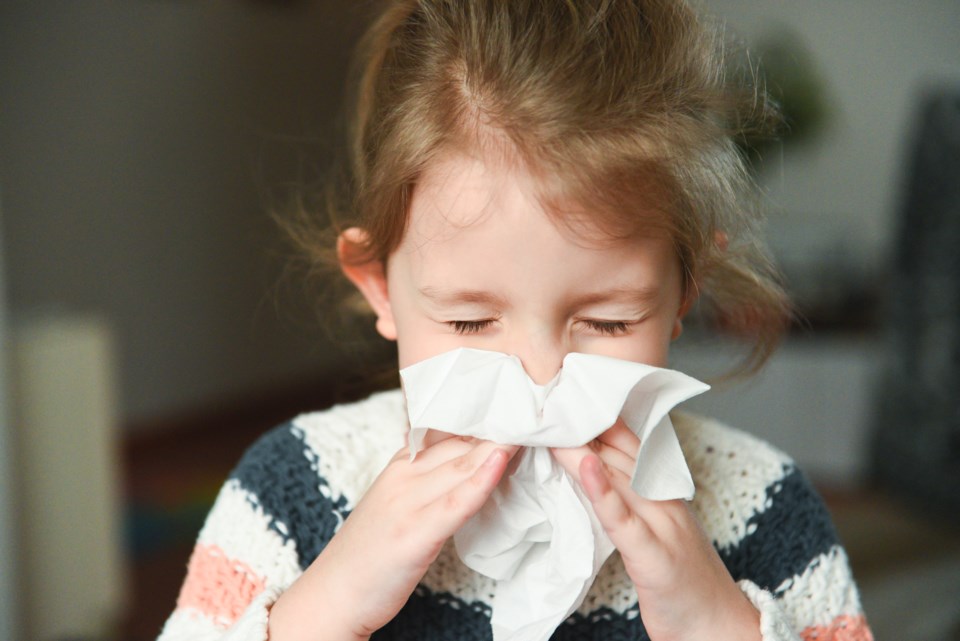It’s that dreaded time of year— cold and flu season! With the kids in childcare or school, they’re likely to pick up and pass around all of the pesky viruses that wreak havoc on their little respiratory systems. Cue the “kindergarten cough.”
Coughs can vary in quality from dry, hacking and spasmodic to croupy, deep and productive. And all variations of cough can be exhausting for your little ones, especially if it’s disrupting their sleep at night (a crucial time for healing and recovery).
Exposure to a cough also puts the rest of the family at risk for infection and while prevention is your best defence, it’s helpful to have a few easy, natural remedies on hand to help them manage their cough so that everyone can feel better quickly.
Love local news? Sign up for our daily headlines email newsletter.
Pro tip: all of these tips can be used in pregnancy, too.
The basics of cough management:
- Keep your child’s room humid — use a humidifier to help ease the respiratory tract irritation. Encourage steam showers and the use of vapour rub for additional ease.
- Keep your child well hydrated by increasing fluid intake like water, soups and herbal teas. Hydration ensures thinning of the mucus to make expelling it easier and is very important if your child is also battling a fever.
- Reduce or restrict dairy until after the infection has cleared, this will help reduce the amount of phlegm your child produces.
- Elevating with pillows helps to open the airway to allow for easier breathing at night. If your infant is in a crib, place some books under the head side of the crib so their crib is at an angle.
Syrups:
- Elderberry syrup is loaded with anti-viral and immune-boosting compounds. Made from the berries of the sambucus nigra plant, elderberry syrup is a lung tonic that is both soothing to the throat while also helping your child recover fast. If you can get your hands on some fresh or freeze-dried berries, you can whip up your own batch at home or buy a ready-made syrup, both are equally effective. If the kids love it, use it daily to help boost respiratory immunity all season long.
- Stodal Honey is a homeopathic honey-based syrup specifically designed to suppress a cough. Please note this is only suitable for babies one year and older. It is effective on both dry and wet coughs, and this gentle homeopathic formula does not contain any dextromethorphan, diphenhydramine or guaifenesin so you can rest assured that your little one will not experience any drowsy or groggy side effects.
Teas:
- Lemon-ginger tea, sweetened with honey (again, only for little ones over one-year-old) is a delicious drink for your child to sip on. The ginger has anti-inflammatory properties that eases the lungs and the honey offers a nice throat coat.
- Other teas that offer soothing effects include, thyme, licorice and marshmallow.
Vapour rub:
- When we think vapour-rub we usually think Vick’s, but this petroleum-based jelly is potentially loaded with polycyclic aromatic hydrocarbons (PAHs) that are toxic chemicals and easily absorbed into the skin.
- For a cleaner and more effective alternative, check your local health store for Stop It Cold Chest Rub Balm by St. Francis Herb Farm. It contains a mix of eucalyptus, peppermint and pine in a shea-butter base that is both gentle and moisturizing to your child’s skin.
- A note on vapour rub— it is never to be used with children under the age of two due to the risk of respiratory distress.
Magic socks:
Traditionally called “Wet Socks”, magic socks utilize the principles of hydrotherapy and can be used in conjunction with other treatments to treat cough, sore throat, headaches, migraines, nasal congestion, upper and lower respiratory infections, and sinus infections. Plus, every kid loves a little magic!
What you will need:
- 1 pair of cotton socks
- 1 pair of thick wool socks
- cold water
Instructions:
- Soak the cotton socks in cold water. Wring them out thoroughly so they do not drip
- Make sure feet are warm before application of cold socks. This is very important for the effectiveness of the treatment. Warm with hot/warm water if necessary.
- Place cold wet socks on warm feet. Then cover with thick wool socks.
- Go directly to bed. Avoid getting chilled.
- Wear socks overnight
- Cotton socks should be dry in the morning
- Repeat nightly if desired.
Thankfully, most coughs are generally self-limiting if associated with mild upper respiratory viral infection. There are some more serious viral infections such as croup and whooping cough that requires close attention.
When to call the doctor for coughs:
- Any coughs with high fever lasting for more than three days
- Pain with breathing
- Wheezing and no history of asthma
- Asthma and having an exacerbation without getting relief from medications
- Breathing is rapid and laboured and not getting better with typical approaches (like humidification or steam shower)
- Unusual breathing sounds aside from ones like croupy cough
- Lips or mouth turning blue, skin looks dusky and they’re having difficulty breathing or shortness of breath — seek emergency care
You’ve got this, mama. Please reach out at www.westendmamas.ca if we can be of any assistance at all. We’re here to help.
NewmarketToday columnist Dr. Sarah Mickeler is a chiropractor and founder of West End Mamas, which offers pelvic floor physiotherapy, as well as other vital prenatal and postnatal treatments in its Newmarket and Toronto locations. Its mission is to improve pregnancy, birth and postpartum for all Canadians.
